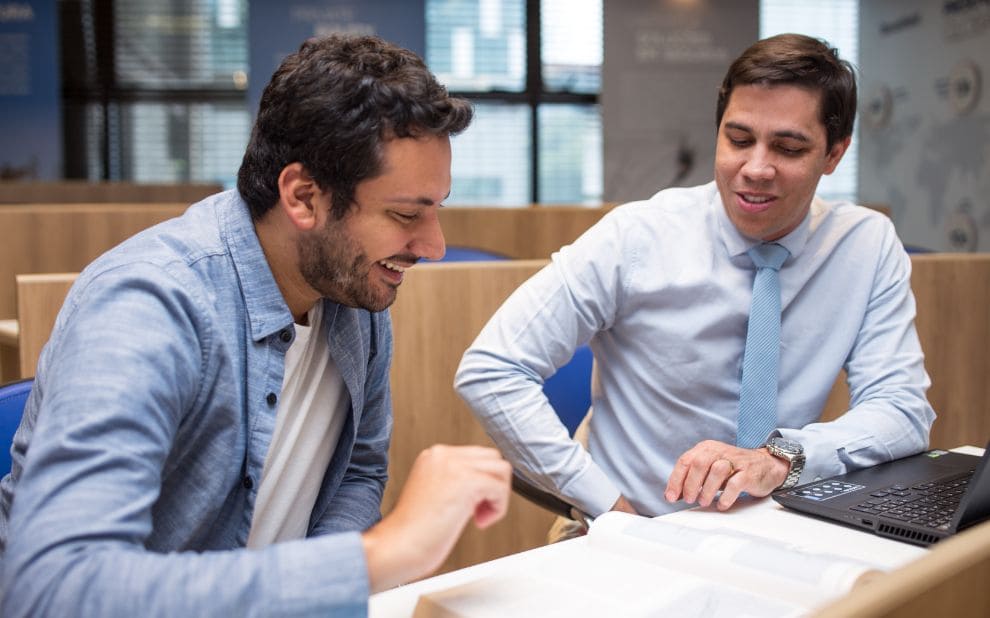Administração
Master’s in practice: Qualifying professionals through scientific research
Find out how some of the research from our Professional Master’s in Administration Program has been applied in the market, generating social, personal and business impacts.

Organizations are facing increasingly complex business challenges, which can only be solved by scientific managers. The Professional Master’s in Administration Program (MPA) at Fundação Getulio Vargas’ Sao Paulo School of Business Administration (FGV EAESP) seeks to train these managers so that they are ready to deal with constant changes in the market and the world. The capacity for logical and critical analysis can yield major professional, business and personal benefits.
For example, Fabio Rodrigues, the CEO of an auto industry company in Joinville, southern Brazil, mapped the main practices adopted by Brazilian industries amid competition with Chinese companies in his research. He also examined the decision-making process related to the choice between producing domestically (making) or acquiring products from abroad (buying).
“The MPA was a turning point in the way I run my company. The academic rigor that a master’s degree requires of a professional opened my mind a lot about what is guesswork, what is proven and how we do proper research. The geopolitics part in particular was interesting. It changed my perspective on how to read the news and interpret different points of view,” Fabio explains.
Maria Luiza Souza is commercial planning director at cosmetics company Natura. She says that the MPA gave her new insights on how to deal with evidence, as well as broadening her capacity for vision. “You learn a different way of thinking, how to look for a logical cause-and-effect relationship, and this has helped me a lot to this day,” she says.
Fabio explains how his research emerged from his everyday professional reality:
“We’re a family of industrialists. I decided to research this topic because we go through a lot of dilemmas: whether to continue to invest in Brazil, buying machinery and equipment and building factories, or whether we should become a big importer and bring everything ready-made from China. I saw many companies making mistakes regarding this decision to make or buy, and I decided to document and analyze everything, because the competition with Asian competitors is very strong. They have competitive prices and infrastructure advantages, while here in Brazil we have a series of systemic issues that hinder industry. Even so, some companies have succeeded in this context,” Fabio explains.
As for the connection between the market and academia, Maria Luiza explains how her research has impacted her work:
“In my research, I was able to identify ways to boost the participation of women on boards of directors and how these opportunities can bring financial or operational benefits to companies. The fact that I was working in the market while doing my master’s degree, at a company that is promoting gender equality, meant that these research reflections could enter into numerous discussions here at the company and I was able to share what I found with numerous colleagues, including in the human resources area. I shared my thesis with many people within the company, at other companies, with board members, and everyone was interested,” says Maria Luiza.
Fabio also tells us what changed at his company after his master’s degree:
“I changed a lot after my master’s degree. I implemented many things at my company, such as product development, for example. It also changed our aggressiveness toward foreign markets. All the research made me better understand how some Brazilian companies, as well as competing here in Brazil, manage to stand out abroad,” he says.
Luciana Parente, engineering and innovation manager at the Águas do Brasil group, tells us how research and knowledge from her master’s degree are closely linked to innovation, her area of activity. “Innovation is directly connected to curiosity and constant learning, which is what we do during the research process on the master’s program. I used several books as pointers on how cultural evolution happens at companies,” she says.
Based on her research into adapting to a culture of innovation, she has been able to implement some changes in practice. “After deciding to study this subject, I was invited to become head of innovation at a large company. So, I was able to experience everything I was studying first-hand and was able to implement some things. The importance of innovation in a company is closely linked to the pain it feels. Innovation is also about improving processes and that’s what I’m doing today, and it’s connected to the company’s culture. What I’ve seen in my research and work is that you need to be open to change. You must want to experiment, cut red tape and know how to test carefully. It’s about creating a new environment of controlled experimentation,” she concludes.
Getting closer to the academic world and having high-potential executives who can find practical solutions to real problems in companies gives a competitive edge in today’s world.
Find out more about the Professional Master’s in Administration Program here.
Leia também
Administração
